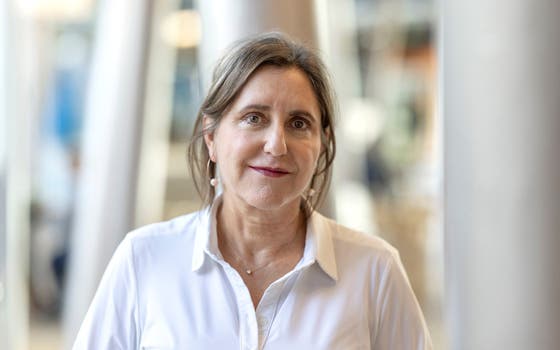Make genetic research more accessible

In the Netherlands, not every patient has equal access to cancer genetic care. It appears that doctors are less likely to refer patients who have difficulty reading and writing, do not speak the Dutch language or are less health literate to the genetics division. "That has to change," Margreet Ausems, professor of Clinical Oncogenetics at UMC Utrecht, argued in her oration on 6 April. She called on doctors to pay attention to these patients.
Research on heredity in cancer
Five to 10 per cent of patients with cancer have an inherited condition. They then qualify for genetic testing. This means investigating the heredity of their condition. This test is important because a possible hereditary predisposition can have consequences for cancer treatment. For example, the patient may be given different medication or may opt for breast removal instead of breast-conserving surgery. There is also often an increased risk of another type of cancer, for which controls or preventive surgery may be available. Genetic testing also provides important information for family members. "Naturally, family members are shocked when they turn out to be carriers of the hereditary predisposition," says Margreet Ausems. "Fortunately, they can often take measures to detect cancer at an early stage. That can really save lives."
Too much information for a vulnerable patient
A doctor who tells a patient he has cancer then gives a patient all the information about additional tests, treatment options, and side effects of treatment. For some patients, this is complicated. "Research shows that healthcare professionals regularly overestimate patients' health skills," says Margreet. Health skills are what you need to obtain, understand and apply information about your health. In everyday life, people with limited health skills struggle to understand invitation letters or e-mails. Finding their way around the hospital is a challenge for them, but having a conversation with healthcare professionals is also often difficult.
Margreet: "When a patient is less health literate or does not speak the Dutch language well, all explanations take healthcare professionals more time. Sometimes it is then too much and too complex to also discuss the subject of cancer hereditary testing."
Training programme for healthcare professionals on comprehensible communication
Margreet develops interventions to make genetic research more accessible to patients with cancer and their families. She does so together with Pharos, the national expertise centre for health inequalities, among others. For instance, she and her team initiated the erfo4all project and she developed a training programme for oncological surgeons and nursing specialists in breast cancer care. The programme consisted of a short online module and group training in the hospital. This involved using an actress to practice situations from everyday practice and then explain hereditary screening to patients in understandable language. Participants also learned how to check whether patients understood their explanations.
"This training programme proved promising. Surgeons and nurse specialists were more aware of the impact of limited health literacy. They reported feeling more confident to discuss hereditary screening with patients in understandable language," Margreet says.
Organising Genetic care differently
Making genetic research accessible requires attention not only to effective communication, but also to organisation of care. Margreet is involved in developing new ways of working within hereditary research. In the new working method, healthcare professionals discuss DNA testing with their patients. They also request this test themselves. Instead of referring patients to the Genetics outpatient clinic. Only patients with an abnormal result of genetic testing are given an appointment with the clinical geneticist. In these projects, input from patient organisations and healthcare professionals was essential. This included tailor-made online training courses for healthcare professionals and the development of patient information. And now Margreet and her team have demonstrated that genetic testing can be responsibly requested for patients with ovarian cancer and breast cancer using this new approach. This makes genetic care not only more accessible, but also affordable.
Future
"Over the next decade, we expect an increase in the number of people diagnosed with cancer. Hereditary factors play a role in some of these people. I would like to see every patient in the Netherlands being able to rely on the medical or nursing specialist himself to do pre-test counselling when there is an indication for genetic testing. That the healthcare professional can provide information about genetic testing and concisely discuss and explain the consequences," states Margreet Ausems. "Even when a patient has difficulty reading or writing, does not speak the Dutch language well or is less health literate. "That is what I stand for. That is what I want to realise together with patient organisations and healthcare professionals."
UMC Utrecht has a centre of expertise for familial cancer that is (inter-)nationally known for their scientific research that improves tailored care for women at increased risk of breast and/or ovarian cancer.
